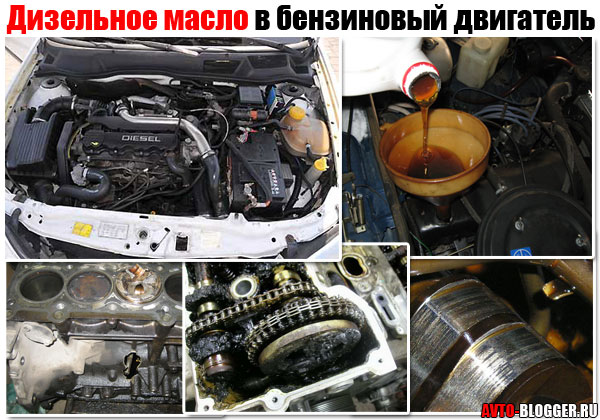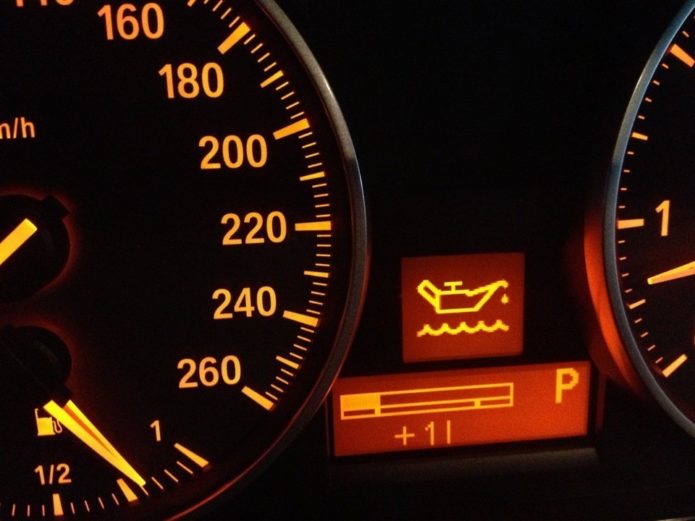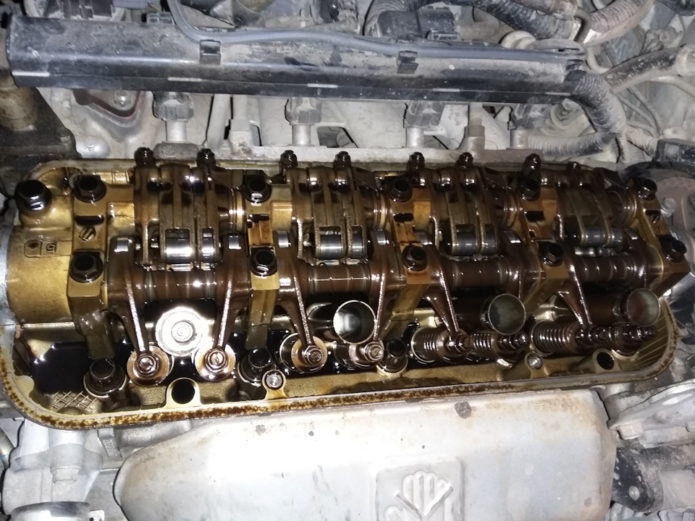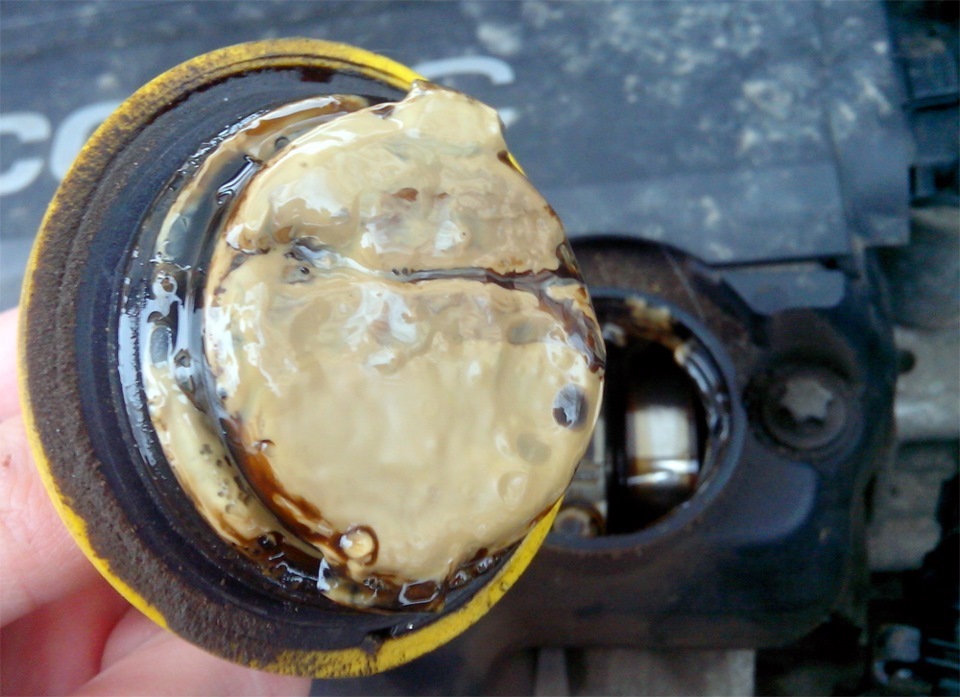
Diesel oil in a gasoline engine: to pour or not to pour?
Content
The processes occurring in internal combustion engines (ICE) depend on the properties of the fuel used. Engine oil manufacturers take into account the characteristics of each type of fuel and create viscous compositions with additives that smooth out the harmful effects of specific substances in diesel fuel or gasoline. It is useful for motorists to know the consequences of using diesel oil in a gasoline engine. Here's what experts and experienced motorists say about this.
Is there a need to deviate from the lubrication regulations

Zero oil is the main reason for forced replacement
An emergency situation is the most common reason for resorting to lubrication not specified by the manufacturer of equipment: an insufficient oil level in the crankcase can cause much more damage to the engine. Another reason to pour dismaslo into a gas engine is its special property to remove carbon deposits from the internal parts of the internal combustion engine. The appearance of universal motor oils contributes to deviations from the regulations: you can rarely see a lubricant intended only for a gasoline engine on store shelves.
Motives not to pour dismaslo into a gas engine
The main reason that does not allow diesel oil to be poured into a gasoline engine is the prohibition of the car manufacturer contained in the car's operational documents. Other motives are associated with the design features of multi-fuel internal combustion engines. They are expressed in the following circumstances:
- the need for increased pressure and temperature in the combustion chamber of a diesel engine;
- speed of the crankshaft of a gasoline engine: for a diesel engine, the rotation speed is <5 thousand rpm;
- ash content and sulfur content of diesel fuel.
From the above list, the purpose of additives in diesel oil is clear: to minimize the destructive effect of physical factors on the lubricant and the effect of harmful substances contained in diesel fuel. For a gasoline engine designed to operate at high speeds, impurities in the oil only harm.
An interesting fact: the fuel in a diesel cylinder is compressed 1,7-2 times stronger than in the combustion chamber of a gasoline engine. Accordingly, the entire crank mechanism of a diesel engine experiences heavy loads.
Opinions of motorists and experts
As for motorists, many consider replacing special oil with diesel useful because of its higher viscosity: if the gasoline engine is already pretty worn out. Not all experts agree with this judgment. Experts cite the following differences in the use of oils:
- The thermal regime of a diesel engine is more intense. Diesel oil in a gasoline engine operates in conditions that are not intended for it, regardless of whether it is good for the engine or bad.
- The high compression ratio in the diesel combustion chamber gives a high intensity of oxidative processes, which are protected by additives added to the lubricant to reduce the flammability of the oil. Other additives help dissolve carbon deposits and soot that are released during the combustion of diesel fuel.
The last property of dismasla is used by motorists in order to flush the insides of the gas engine and decarbonize - clean the piston rings from soot. Gasoline internal combustion engines are cleaned with a car mileage in low-speed mode in the amount of 8–10 thousand km.
Most car manufacturers indicate specific brands of oils for use, not recommending the use of universal lubricants. The problem is that combined lubricants are often given out for pure gasoline oils by adding an inscription about gasoline. In fact, they contain additives that a gasoline engine does not need.
Consequences of violating the rules of operation

There are no obvious signs of violation of the rules
The outcome of the use of diesel oil in a gasoline engine will be more noticeable if diesel oil is used that is intended for truck diesel engines. Their lubricating fluid contains more alkaline reagents and additives that increase the ash content. To reduce harm to a gas engine, it is better to use oil designed for passenger diesel engines.
For your information: the amount of additives in diesel oil reaches 15%, which is 3 times higher than in lubricating fluids for gasoline internal combustion engines. As a result, the antioxidant and detergent properties of diesel oil are higher: motorists who have used oil changes claim that the gas distribution mechanism looks like new after that.
The consequences of using diesel oil also depend on the type of gasoline engine:
- Carburetor and injection internal combustion engines differ only in the way fuel is supplied to the combustion chamber: the second modification involves injection by a nozzle, which provides an economical mode of fuel consumption. The diversity of internal combustion engines does not affect the applicability of diesel oil in such engines. There will be no great harm from the short-term use of dimasl in the engines of domestic VAZs, GAZs and UAZs.
- Asian vehicles are designed for low viscosity oils due to narrow oil ducts or passages. A thicker lubricating fluid for diesel engines has less mobility, which will cause difficulties with engine lubrication and lead to malfunctions of the internal combustion engine.
- Cars from Europe and the USA of mass use - for them, a one-time filling of diesel oil will go unnoticed if you do not tighten it with a change in temporary lubricant to a liquid recommended by the manufacturer. The second condition is not to accelerate the engine more than 5 thousand revolutions.
- A turbocharged gasoline engine requires a special oil that can withstand high temperatures: the acceleration of the turbine for pressurization of air is carried out by exhaust gases. The same lubricant works inside the engine and in the turbocharger, it turns out to be in harsh conditions. It is for high temperatures and pressures that diesel oil is intended. It is important to use a quality lubricant and not to allow its level to decrease. However, such a substitution is allowed only for a while to get to the service station.
In any case, dismaslo does not withstand high speeds. No need to make accelerations while driving, no need to overtake. By following these simple rules, the risks of negative consequences of emergency filling of diesel oil into a gasoline engine can be minimized.
Reviews of motorists about the results of the substitution
An analysis of the statements of drivers on the Internet about the universal use of dismasl shows that how many people, so many opinions. But the optimistic conclusion is still prevailing that there will be no great harm from pouring diesel oil into the gasoline engine. Moreover, there are examples of long-term operation of domestic passenger cars on lubricants intended for diesel engines:
In the early 90s, when Japanese women began to carry, almost everyone drove on KAMAZ oil.
Diesel oil can be poured into a gasoline engine, on the contrary, it is impossible. There are more requirements for diesel oil: it is better in its characteristics.
Indicative can be considered a review from Andrey P., who drove 21013 thousand km with diesel oil from KAMAZ in the VAZ-60 engine. He notes that a lot of slag is formed in the internal combustion engine: the ventilation system and rings are clogged. The process of accumulation of soot depends on the brand of diesel oil, season, operating conditions and other factors. In any case, the life of the engine will be reduced.
ICE manufacturers, when developing an engine lubrication system, take into account all its design and operational features, and make their recommendations on oils in the accompanying documents. It is not necessary to neglect the established regulations. Deviation from the rules will inevitably lead to a reduction in the service life of any equipment. If a critical situation has arisen, they choose the lesser of two evils - pour diesel oil into the gas engine and slowly drive to the workshop.
